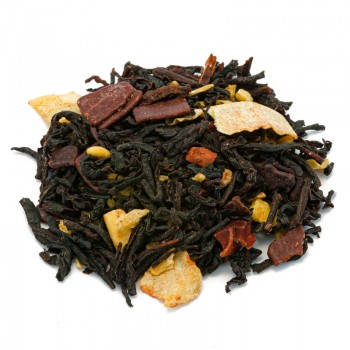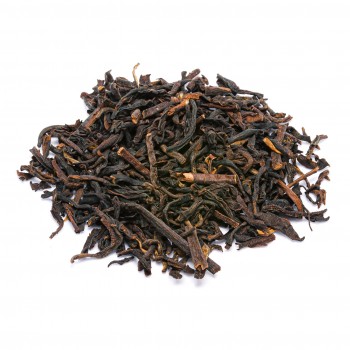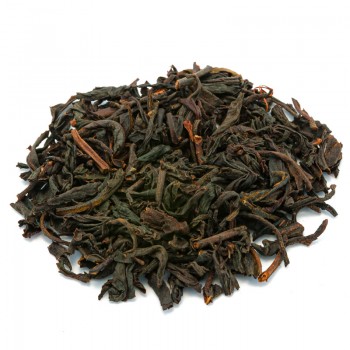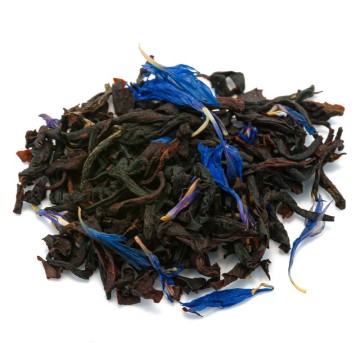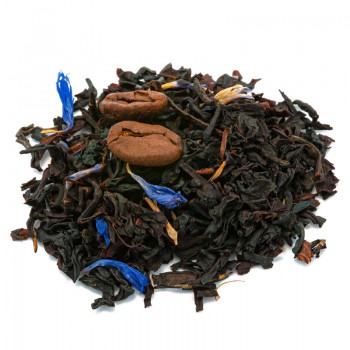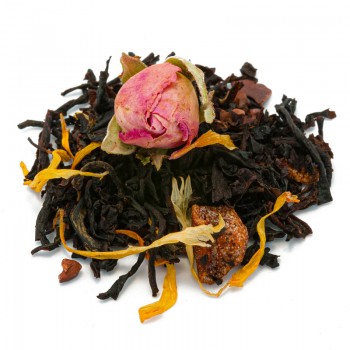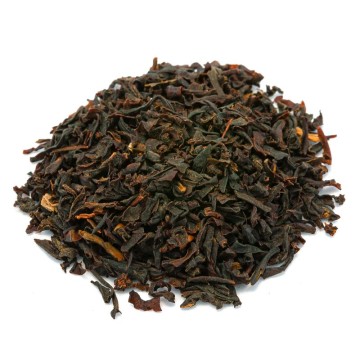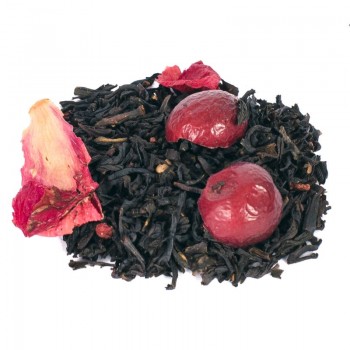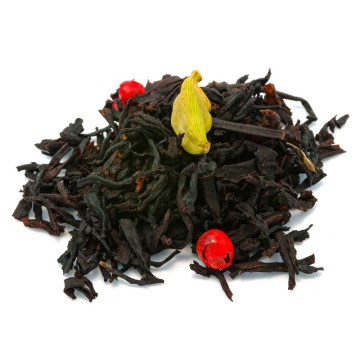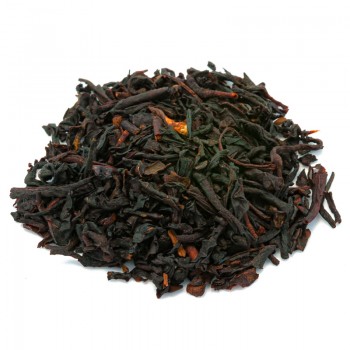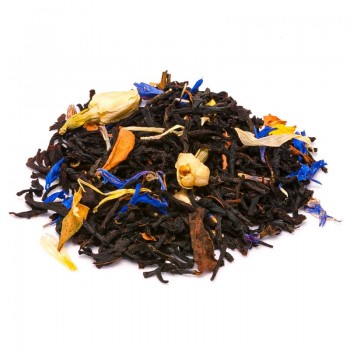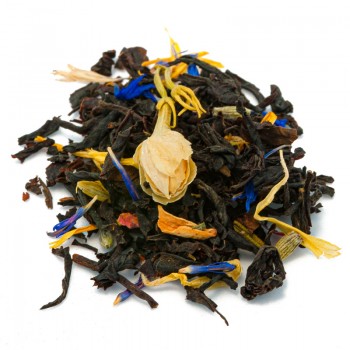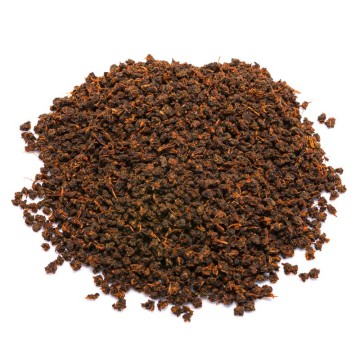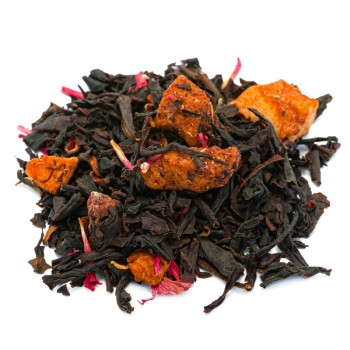This tea comes from the Hualien district, located on the eastern coast of the island of Taiwan, formerly known as Formosa. This is the home of Honey Black tea, a specialty produced primarily during the summer months. It is during this season that the young tea leaves are nibbled by small insects (a type of cicada), causing them to stop growing and curl. When they bite, the insects release their salivary juice, which triggers a reaction with the plant's chemical defense mechanisms. The result is unique: a lingering sweet and fruity flavor with a hint of honey, hence the name Honey Formosa black tea. It exudes an aroma reminiscent of Oolong, despite being a black tea, with floral notes, a natural honeyed touch, and malty aromas. In the cup, the tea releases a bright reddish color, similar to bronze, and on the palate it is smooth and full-bodied.
The surprising flavor of this honey-infused black tea from Taiwan is now famous worldwide as a premium and exclusive tea—a "Bug Bitten Tea." It's recognizable by its dark brown leaves with slightly curled copper-colored tips. It's processed using a long process, with natural withering and rolling, as with all black teas, which increases the antioxidant polyphenol content. Insect bites are tiny, imperceptible to our eyes, and the more insects nibble the leaves, the more the honeyed flavor intensifies. To preserve this natural interaction, no insecticides are used on the leaves of this tea—a factor that makes it appreciated for its delicious, healthy, and naturally aromatic properties.
What are the beneficial properties of black tea?
This beverage is known for its antioxidant polyphenol content, particularly theaflavin and thearubigin, which are beneficial for our well-being. They can help our body combat the oxidative stress to which cells are subjected, with the degenerative damage and aging that can result.
Black tea can be an ally in waking up, as it naturally contains caffeine, a stimulant for the nervous system and a source of energy. It helps maintain attention and concentration, promoting cognitive activity and acting as an invigorating tonic in cases of physical and mental fatigue. It activates our body in a similar way to coffee, but without its excessive stimulant effects (nervousness, rapid heartbeat, etc.). This is because black tea contains an amino acid, L-theanine, which balances the stimulant properties of these substances, promoting longer-lasting and less intense benefits than coffee.
The stimulant properties of black tea also make it a valuable aid in maintaining a balanced body weight. Combined with a healthy lifestyle and a balanced diet, it stimulates metabolism and promotes fat burning. Furthermore, Honey Formosa black tea provides a sweet and satisfying sensation on the palate, useful during diets to avoid snacking.
Black tea can have digestive benefits, as its antioxidants promote the growth of healthy intestinal bacteria. Containing caffeine, black tea can aid digestion with a mild natural laxative effect, useful for those suffering from constipation. Furthermore, it helps drain body fluids thanks to its polyphenols, promoting the elimination of toxins with its diuretic effect. When is the best time to drink Honey Formosa black tea? In the morning for energy upon awakening and after meals to aid digestion.
The nutrients in black tea
It contains components such as antioxidant polyphenols—flavonoids, catechins, flavanols—B vitamins, and minerals (fluoride, calcium, zinc, magnesium, and potassium). It also contains tannins, enzymes, amino acids including L-theanine, and methylxanthines, alkaloids including caffeine, theophylline, and theobromine.
How long should Honey Formosa black tea steep?
Insert about 3-5 grams of black tea into a cup (250 ml) of water at 90-95°C. Steep for 3 to 5 minutes before drinking.
Honey Formosa Black Tea: Sizes Available for Purchase in Our Online Shop
This particular variety of Taiwanese tea is not easy to find in regular supermarkets or grocery stores. Our Natura d'Oriente online tea shop allows you to obtain this naturally flavored loose black tea in convenient 25g, 50g, 75g, 100g, 150g, and 300g packs. The freshness-preserving packaging of Honey Formosa loose tea allows you to calculate the exact grams of product needed for each cup or teapot.
How is Taiwanese honey black tea obtained?
Black tea is a more oxidized form of tea than oolong, green, or white tea, but it still comes from the leaves of Camellia Sinensis. It is a plant native to China, consisting of evergreen shrubs or small trees, belonging to the familyIt belongs to the Theaceae family of flowering plants. The most famous varieties of black tea are Camellia sinensis var. sinensis, var. assam, and var. cambodiensis.
Tea cultivation in Taiwan is primarily derived from the sinensis variety, originally from China. On the island, located off the southeastern coast of China, some areas feature fertile plains and mountainous regions, where high-quality teas grow. They have been cultivated since the 18th century, when tea traders settled in Taiwan, bringing Camellia sinensis seeds from the Wuyi mountain area.
The insect that attacks the tea plant is the Jacobiasca formosana, a type of cicada that also attacks cotton plants. Initially, these insects were eliminated as dangerous, but today they are used to produce Oriental Beauty teas, among the rarest of all, and Guifei Oolong, as well as this particular black tea, Honey Black. Cicadas suck the sap from tea leaves, which, as a defense mechanism, begin to secrete a juice that attracts spiders, the cicada's natural enemy. This emanation changes the chemistry of the leaves, and if the leaves are processed properly (oxidized, dried, and rolled), the tea takes on a honey-like aroma. This process occurs only if the plant is grown naturally, without pesticides or insecticides. The area in Taiwan where tea is grown and these cicadas are present is the Hualien district.
Black tea side effects and contraindications
Excessive consumption is risky due to the amount of caffeine in black tea, which can cause adverse effects such as agitation, palpitations, difficulty sleeping, nausea and stomach pain, and diarrhea. Many of these side effects only occur if black tea is consumed in excessive quantities, so it is best to keep intake to moderate levels. Drinking up to two cups of black tea a day presents no particular problems, except for those who are sensitive to caffeine or are taking medications that interfere with it. In these cases, it's best to consult your doctor.

![Black tea Honey Black Formosa [Natura d'Oriente] Black tea Honey Black Formosa [Natura d'Oriente]](https://www.naturadoriente.com/3390-large_default/black-tea-honey-black-formosa-.jpg)
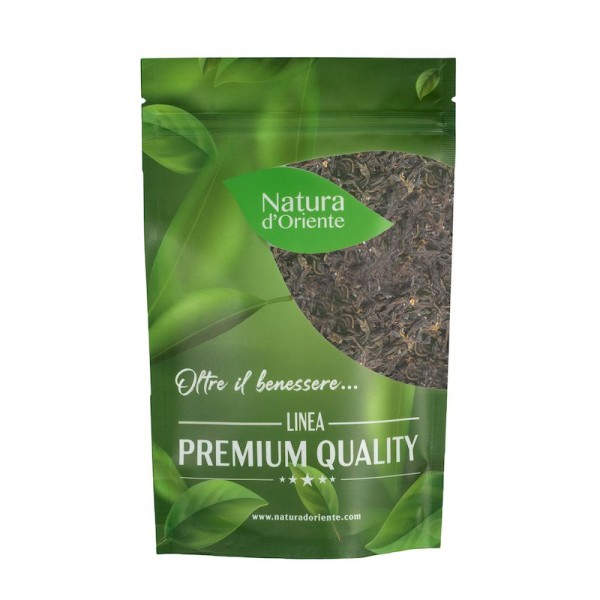



![Black tea Honey Black Formosa [Natura d'Oriente] Black tea Honey Black Formosa [Natura d'Oriente]](https://www.naturadoriente.com/3390-home_default/black-tea-honey-black-formosa-.jpg)




 No reward points for this product.
No reward points for this product.
